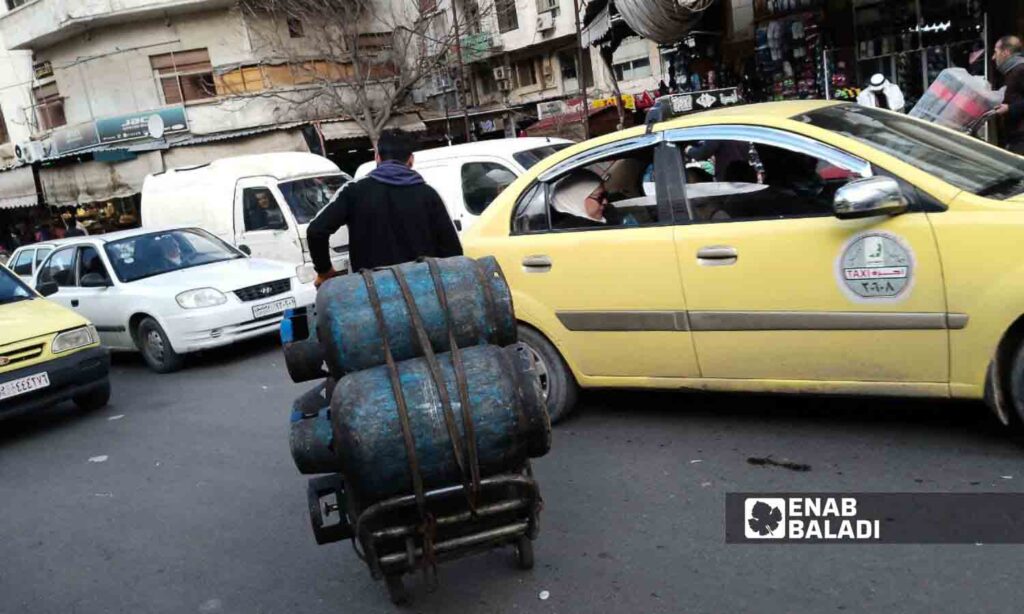Receiving a message to collect her gas cylinder is an event that occurs for Reem, a resident of the town of al-Taybeh in Daraa, every 75 days. However, the gas cylinder often runs empty within 13 days because half of the cylinder is filled with water, according to what she told Enab Baladi.
Residents of the city of Daraa complain about receiving domestic gas cylinders filled with water after waiting for more than 70 days, with the cylinders running out after just 15 days of use.
Complaints have extended to many Syrian provinces including As-Suwayda, Quneitra, Tartus, amidst similar government justifications.
“Half is water”
Reem began noticing that the gas cylinders were filled with water about two months ago when large amounts of water flowed from her gas cylinder after it was exhausted.
Her husband, a teacher, discussed this issue in front of the school’s instructional staff, and found that others in the staff were also receiving cylinders filled with water.
The cost of exchanging a subsidized gas cylinder is 20,000 Syrian pounds, and the price of an unsubsidized gas cylinder is 80,000 Syrian pounds, while the price of a free-market gas cylinder has reached 270,000 Syrian pounds.
Reem (39 years old) often has to resort to making pastries like pies and others by burning tree branches under a baking plate to save gas usage.
The gas distributor Reem’s family deals with has denied any involvement in filling the gas cylinders with water.
Samir, a citizen from al-Kashef neighborhood in the city of Daraa, told Enab Baladi that in recent months, he has also noticed water coming out of the gas cylinder when he went to exchange it. He has filed a complaint with the responsible authorities, but has seen no outcome.
Complaints for months
Ahmad, a gas distributor in al-Sabil neighborhood, told Enab Baladi that complaints have been on the rise since August 2023, with new ones recorded every day, reaching the distributors from their distribution areas.
He added that the distributors have no relationship with the filling of the gas cylinders; the cylinders come sealed tightly and filled from the domestic and industrial filling unit.
If there is “fraud,” it is on the part of the filling unit to save on costs and trade in gas.
The distributor found a gas cylinder filled with water that he had exchanged for his home and sent a complaint about two months ago to the director of the filling unit. The response was that the unit would handle the matter and tighten monitoring more closely, but the situation remained unchanged, according to Ahmad.
Repeated government justifications
The assistant director of the Daraa fuel branch and the head of the gas department, Ziad al-Khatib, told the al-Thawra newspaper on February 20 that “the reasons behind the delay in receiving gas refill messages are due to a shortage in the province’s allocations of the liquid material, the unavailability of a sufficient number of transport tankers, and frequent breakdowns.”
Not just the city of Daraa, other provinces’ residents had complained before, with numerous reports of “fraud” in the filling of domestic gas cylinders, as Syrian newspaper al-Watan stated. On January 18, many complaints reached the newspaper from the city of As-Suwayda about “fraud” practices during the filling of domestic gas cylinders.
The newspaper added that a responsible source in the As-Suwayda fuel company stated that the company is not responsible for the number of days a gas cylinder lasts with the families due to the unknown usage methods, and that the company’s responsibility is limited to technically ensuring the cylinder and its systemic weight before leaving the company.
The citizen, who has a technical problem with the cylinder received or suspects water is inside, must visit the company without emptying it, to have it examined and verified by any distributor or the entity from which it was received, according to the official.

